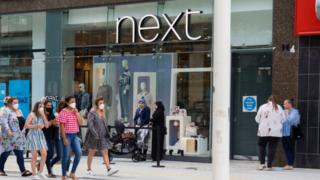 Image copyright
Getty Images
Image copyright
Getty Images
Staff working from home for fashion retailer Next have been "stultified" by boring online presentations and missed out on office camaraderie, the company said.
Next said that overall, the impact of the pandemic on business had been "expensive and miserable".
But it had also seen some advantages from the upheaval, it added.
Next said it expected some home working to continue and that the balance would "evolve over time".
Along with all "non-essential" retailers, Next was forced to close its doors when the pandemic struck. But it continued to meet online orders after overhauling work practices at its warehouses to allow for social distancing.
Announcing its financial results for the first six months of the year, including a 34% drop in sales over the worst of the lockdown, the fashion chain said some good had come from the experience.
"It is remarkable what can be learnt from shutting down your entire operation and slowly, department by department, store by store, warehouse by warehouse, bringing it back to life," Next said in a statement.
Warehouses and call centres had become more efficient, while staff in other areas had been forced to make more of new technology, it said.
Millions of UK workers switched to working partly or completely from home when the country went into lockdown in March. Many welcomed the break from the daily commute and office politics.
But the government is keen to encourage workers back into the office, to revive city centres dependent on coffee drinkers and lunch-break shoppers.
Businesses have taken a mixed approach. Some, such as Twitter, say employees might continue to work from home even after the threat from the virus subsides. The chief executive of Netflix, Reed Hastings, however, has said staff will return to the office "12 hours after a vaccine is approved".
'Stultified'
Next said having staff "sitting in their spare bedrooms, kitchens and conservatories" had had pros and cons.
Video calls for large groups had proved "unwieldy, frustrating and inefficient".
"Worst of all, perhaps, large video calls have encouraged the proliferation of one of the business world's most damaging practices - death by deck," it said.
Explaining further, it said this meant "slideshow presentations that transform meetings from productive exchanges of ideas into boring, one-way lectures, with the 'presenters' rattling through bullet points already visible to their stultified audience".
Image copyright Next Image caption Online sales held up during lockdown, with childrens' wear and sportswear performing stronglyNext said the biggest problem with home working was the lack of spontaneous conversations and the chance to learn from colleagues.
On the other hand, it had allowed people to focus more effectively on some solitary tasks, including systems coding and product design.
Restrictions on overseas travel meant buyers had used video calls rather than visiting suppliers, while decisions were no longer "saved up" for trips.
Next said that had empowered individuals and been liberating.
"With hindsight, it appears that the corporate machine was supporting the inexperienced and the less able, but holding back the strong," Next said.
'Resilient'
The 34% fall in sales saw wedding outfits and work clothes particularly badly hit. However, business had proven "more resilient than we expected", the firm said.
Pre-tax profit was £9m for the first half of the year.
Next said it was fortunate that half of its revenues were already coming from online sales before the onset of the pandemic.
It also said sales held up better at Next's out-of-town outlets, which customers can drive to more easily.
Home, children's wear, loungewear and sportswear sales did well.
Next has revised its profit forecast for the full year from £195m to £300m.

 5 years ago
796
5 years ago
796 

